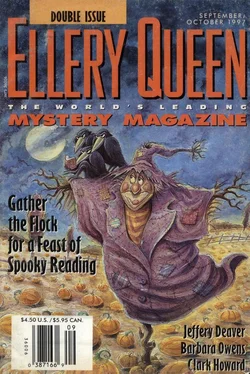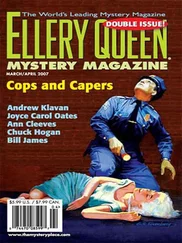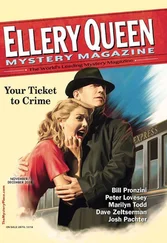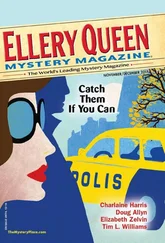William Bankier - Ellery Queen’s Mystery Magazine, Vol. 110, No. 3 & 4. Whole No. 673 & 674, September/October 1997
Здесь есть возможность читать онлайн «William Bankier - Ellery Queen’s Mystery Magazine, Vol. 110, No. 3 & 4. Whole No. 673 & 674, September/October 1997» весь текст электронной книги совершенно бесплатно (целиком полную версию без сокращений). В некоторых случаях можно слушать аудио, скачать через торрент в формате fb2 и присутствует краткое содержание. Город: New York, Год выпуска: 1997, Издательство: Dell Magazines, Жанр: Детектив, на английском языке. Описание произведения, (предисловие) а так же отзывы посетителей доступны на портале библиотеки ЛибКат.
- Название:Ellery Queen’s Mystery Magazine, Vol. 110, No. 3 & 4. Whole No. 673 & 674, September/October 1997
- Автор:
- Издательство:Dell Magazines
- Жанр:
- Год:1997
- Город:New York
- ISBN:нет данных
- Рейтинг книги:4 / 5. Голосов: 1
-
Избранное:Добавить в избранное
- Отзывы:
-
Ваша оценка:
- 80
- 1
- 2
- 3
- 4
- 5
Ellery Queen’s Mystery Magazine, Vol. 110, No. 3 & 4. Whole No. 673 & 674, September/October 1997: краткое содержание, описание и аннотация
Предлагаем к чтению аннотацию, описание, краткое содержание или предисловие (зависит от того, что написал сам автор книги «Ellery Queen’s Mystery Magazine, Vol. 110, No. 3 & 4. Whole No. 673 & 674, September/October 1997»). Если вы не нашли необходимую информацию о книге — напишите в комментариях, мы постараемся отыскать её.
Ellery Queen’s Mystery Magazine, Vol. 110, No. 3 & 4. Whole No. 673 & 674, September/October 1997 — читать онлайн бесплатно полную книгу (весь текст) целиком
Ниже представлен текст книги, разбитый по страницам. Система сохранения места последней прочитанной страницы, позволяет с удобством читать онлайн бесплатно книгу «Ellery Queen’s Mystery Magazine, Vol. 110, No. 3 & 4. Whole No. 673 & 674, September/October 1997», без необходимости каждый раз заново искать на чём Вы остановились. Поставьте закладку, и сможете в любой момент перейти на страницу, на которой закончили чтение.
Интервал:
Закладка:
“Can’t you guess?”
“No...”
But even as he said that, he understood. Lescroix closed his eyes. Sat on the bed. “Your father-in-law.”
The rich businessman. Patricia’s father.
I’m a firm believer in kin sticking together...
“He hired me?”
“We both did,” Cabot said.
“To defend your wife’s killer? Why?”
Cabot sighed. “Why do you think, counselor?”
Slowly, Lescroix’s thoughts were forming — like ice on a November pond. He said slowly, “Because there’s no death penalty in this state.”
“That’s right. Maybe Jerry’d go to prison for life but that wasn’t good enough for us.”
And the only way Cabot and his father-in-law could get to Jerry was to make sure he was acquitted. So they hired the best criminal attorney in the country.
Lescroix laughed in disgust. Why, Cabot was the one playing him in the trial. Acting guilty, never explaining what he might’ve explained, cringing at Lescroix’s far-fetched innuendos. Suddenly Lescroix remembered Cabot’s words: Jerry’s tied up right now ...
“Oh my God, are you going to kill him?”
“Jerry? Oh, we’re just visiting right now,” Cabot said, “Jerry and me and Patsy’s dad. But I should tell you, I’m afraid he’s pretty depressed, Jerry is. I’m worried that he might do himself some harm. He’s even threatened to hang himself. That’d be a shame. But of course it’s a man’s own decision. Who’m I to interfere?”
“I’ll tell the police,” Lescroix warned.
“Will you now, counselor? I guess you could do that. But it’ll be my word against yours, and I have to say that after the trial today your stock’s none too high round here at the moment. And neither’s Jerry’s.”
“So what’re you buying?”
“Peace of mind. That’s what.”
“Sorry to cut this short,” Cabot continued. “I think I hear some funny noises from the other room. Where Jerry is. I better run, check on him. Seem to recall seeing a rope in there.”
“Wait...”
A low, desperate moaning sounded through the line, distant.
“What was that?” Lescroix cried.
“Oh-oh, looks like I better go. So long, counselor. Hope you enjoyed your stay in Hamilton. Come back and see us sometime.”
“Wait!”
Click.
Herbert in Motion
by Ian Rankin
© 1997 by Ian Rankin
Winner of the 1996 CWA gold dagger, the U.K’s highest honor for crime writing, “Herbert in Motion” is a work that combines Ian Rankin’s characteristically wry social commentary with a stunningly original suspense plot. Mr. Rankin has won the gold dagger for best short story two out of the last three years; he is one of the most talented of the younger British writers.
My choices that day were twofold: kill myself before or after the prime minister’s cocktail party? And if after, should I wear my Armani to the party, or the more sober YSL with the chalk stripe?
The invitation was gilt-edged, too big for the inside pocket of my workaday suit. Drinks and canapés, six P.M. till seven. A minion had telephoned to confirm my attendance, and to brief me on protocol. That had been two days ago. He’d explained that among the guests would be an American visiting London, a certain Joseph Hefferwhite. While not quite spelling it out — they never do, do they? — the minion was explaining why I’d been invited, and what my role on the night might be.
“Joe Hefferwhite,” I managed to say, clutching the receiver like it was so much straw.
“I believe you share an interest in modern art,” the minion continued.
“We share an interest.”
He misunderstood my tone and laughed. “Sorry, ‘share an interest’ was a bit weak, wasn’t it? My apologies.”
He was apologising because art is no mere interest of mine. Art was — is — my whole life. During the rest of our short and one-sided conversation, I stared ahead as though at some startling new design, trying to understand and explain, to make it all right with myself, attempting to wring out each nuance and stroke, each variant and chosen shape or length of line. And in the end there was... nothing. No substance, no revelation; just the bland reality of my situation and the simple framing device of suicide.
And the damnation was, it had been the perfect crime.
A dinner party ten years before. It was in Chelsea, deep in the heart of Margaret Thatcher’s vision of England. There were dissenters at the table — only a couple, and they could afford their little grumble; it wasn’t going to make Margaret Hilda disappear, and their own trappings were safe: the warehouse conversion in Docklands, the BMW, the Cristal champagne and black truffles.
Trappings: The word seems so much more resonant now.
So there we were. The wine had relaxed us, we were all smiling with inner and self-satisfied contentment (and wasn’t that the dream, after all?) and I felt just as at home as any of them. I knew I was there as the Delegate of Culture. Among the merchant bankers and media figures, political jobsworths and “somethings” (and dear God, there was an estate agent there too, if memory serves — that fad didn’t last long) I was there to reassure them that they were composed of something more lasting and nourishing than mere money, that they had some meaning in the wider scheme. I was there as the curator to their sensibilities.
In truth, I was and am a senior curator at the Tate Gallery, with special interest in twentieth-century North American art (by which I mean paintings: I’m no great enthusiast of modern sculpture, yet less of more radical sideshows — performance art, video art, all that). The guests at the table that evening made the usual noises about artists whose names they couldn’t recall but who did “green things” or “you know, that horse and the shadow and everything.” One foolhardy soul (was it the estate agent?) digressed on his fondness for certain wildlife paintings and trumpeted the news that his wife had once bought a print from Christie’s Contemporary Art.
When another guest begged me to allow that my job was “on the cushy side,” I placed knife and fork slowly on plate and did my spiel. I had it down to a fine art — allow me the pun, please — and talked fluently about the difficulties my position posed, about the appraisal of trends and talents, the search for major new works and their acquisition.
“Imagine,” I said, “that you are about to spend half a million pounds on a painting. In so doing, you will elevate the status of the artist, turn him or her into a rich and sought-after talent. They may disappoint you thereafter and fail to paint anything else of interest, in which case the resale value of the work will be negligible, and your own reputation will have been tarnished — perhaps even more than tarnished. Every day, every time you are asked for your opinion, your reputation is on the line. Meanwhile, you must propose exhibitions, must plan them — which often means transporting works from all around the world — and must spend your budget wisely.”
“You mean like, do I buy four paintings at half a mil each, or push the pedal to the floor with one big buy at two mil?”
I allowed my questioner a smile. “In crude economic terms, yes.”
“Do you get to take pictures home?” our hostess asked.
“Some works — a few — are loaned out,” I conceded. “But not to staff.”
“Then to whom?”
“People in prominence, benefactors, that sort of person.”
“All that money,” the Docklands woman said, shaking her head, “for a bit of paint and canvas. It almost seems like a crime when there are homeless on the streets.”
Читать дальшеИнтервал:
Закладка:
Похожие книги на «Ellery Queen’s Mystery Magazine, Vol. 110, No. 3 & 4. Whole No. 673 & 674, September/October 1997»
Представляем Вашему вниманию похожие книги на «Ellery Queen’s Mystery Magazine, Vol. 110, No. 3 & 4. Whole No. 673 & 674, September/October 1997» списком для выбора. Мы отобрали схожую по названию и смыслу литературу в надежде предоставить читателям больше вариантов отыскать новые, интересные, ещё непрочитанные произведения.
Обсуждение, отзывы о книге «Ellery Queen’s Mystery Magazine, Vol. 110, No. 3 & 4. Whole No. 673 & 674, September/October 1997» и просто собственные мнения читателей. Оставьте ваши комментарии, напишите, что Вы думаете о произведении, его смысле или главных героях. Укажите что конкретно понравилось, а что нет, и почему Вы так считаете.












